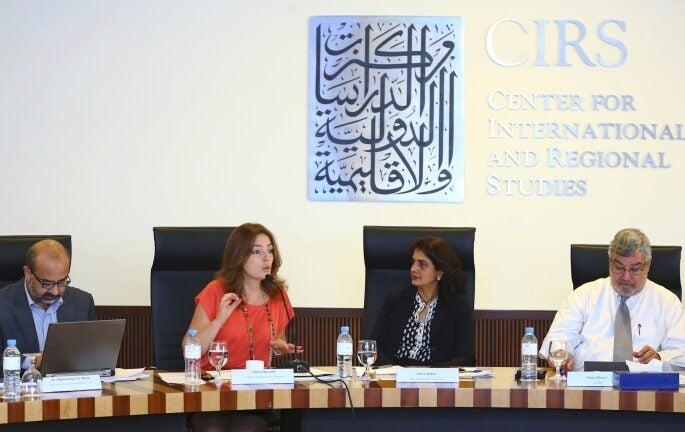Panels, Race & Society, Regional Studies
AUB-CIRS Host Panel on Knowledge Translation

The Consortium of Arab Policy Research Institutes (CAPRI) at the Issam Fares Institute for Public Policy and International Affairs (IFI) and the Center on Knowledge-to-Policy for Health at AUB collaborated with CIRS to host a workshop on September 12, 2013, entitled “Knowledge Translation: Bridging the Gap between Research and Policy II”. This one-day event brought together academics, representatives from research institutes, policy analysts, and advocates from around the region to understand the linkage between knowledge production and policy making in the Arab world.
Multiple research centers and particularly policy research institutes (PRIs) have emerged throughout the Middle East in the recent years. In addition to independent institutions, several universities have become more research oriented in acknowledgement of the value of knowledge production and its vital contribution to innovation and evidence-based advocacy. Moreover, experts at the Center on Knowledge-to-Policy for Health at AUB noted that the incentive system of research in the region is evolving, so that research centers and universities are increasingly engaging in areas of inquiry that are policy relevant. Since the majority of policy research institutes in the region are still in their nascent stages, they face some significant challenges. For one, the receptivity of policy makers to researchers remains limited as they rarely create spaces for utilizing research evidence in their policy making process. Secondly, local research in Arab countries is perceived to have limited credibility, and regional government officials continue to heavily rely on international consultants. Recommendations to alleviate those challenges were provided by experts at IFI, suggesting that first, research centers should develop credibility in a certain area over a number of years, and second, researchers should interact with state officials and policymakers in order to better understand their needs and keep them informed on their own research output.
With the presence of over 240 PRIs in the region, institutes such as CAPRI are identifying ways of strengthening the outreach and communication strategies of research centers in order to enhance their efficacy in impacting policy. Workshop participants presented both their experiences in linking research with advocacy to influence policy change. In the case of theTobacco Free Initiative in Lebanon, for example, civil society organizations worked with researchers at AUB to achieve two goals. First, they mobilized the public by transmitting information on the dangers of public smoking and second they augmented their advocacy to policy makers by informing them of the level of support within their voting constituency for policy change. During this process, it was highlighted that research needs to be repackaged and transformed into something that is easily communicated in order to increase its receptivity. The media was identified as a vital intermediary between activists and their target audience, both in mobilizing support from citizens and in influencing policy makers to achieve change.
Although the Tobacco Free Initiative in Lebanon presents a success story, it was recognized by the workshop participants that in other political settings different tactics need to be utilized. In more autocratic Arab countries where votes cannot be used as leverage, policy advocates face the challenge of identifying means by which they can influence policy makers. Moreover, while the media is a vital force in fostering change in some societies, its utilization by activists in other countries may backfire. It was noted that in some states, policymakers and members of the ruling regime may view this public form of policy advocacy negatively, and take it as an attempt to destabilize the state. Thus, in more autocratic settings, policy makers fear setting the precedent whereby the media can drive policy, and have accordingly resisted publicly communicated policy changes. Another point of departure from the Lebanese case study is the limited presence of non-governmental organizations (NGOs) or civil society organizations (CSOs) in other countries around the Middle East. As discussed during the workshop, this has two major implications on linking knowledge production to policymaking. First, policy advocacy transforms into a top-down process, whereby activists introduce the initiatives to those in power rather than attempting to mobilize people behind their cause. Secondly, with the limited presence of CSOs, researchers are left with the task of producing research, disseminating knowledge, formulating evidence-based policy, and engaging in policy advocacy. The latter directly falls in line with the new evolving role of researchers and universities that are increasingly reaching out to decision makers and affecting policy. Participants in the workshop concluded that while building the capacity of researchers to repackage knowledge for the policy world is a technical process, developing a culture that is conducive to research-based policy requires social and political buy-in.
- See the workshop schedule
- Read participant biographies
Article by Dwaa Osman, Research Analyst at CIRS